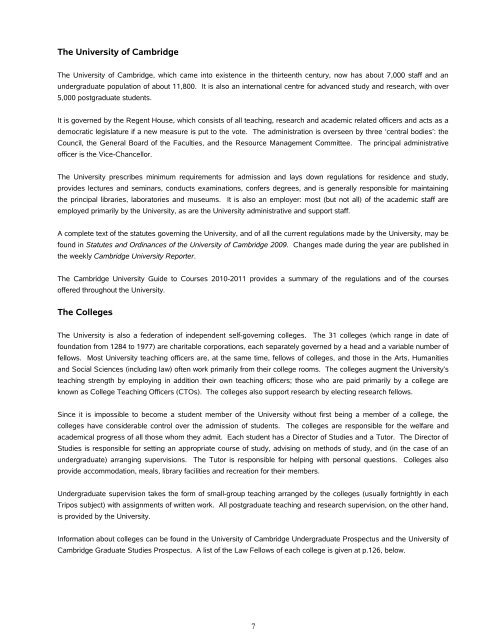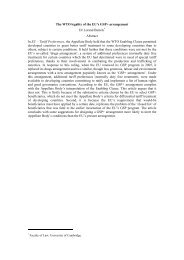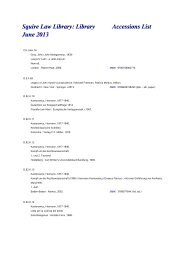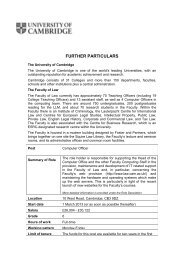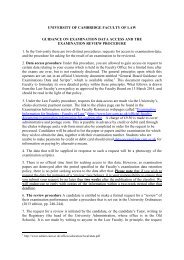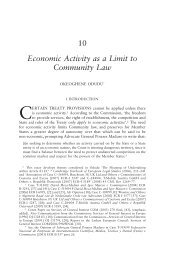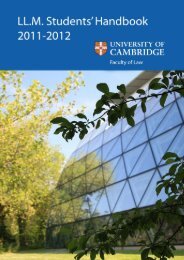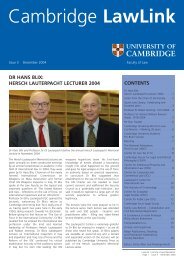Contents - Faculty of Law - University of Cambridge
Contents - Faculty of Law - University of Cambridge
Contents - Faculty of Law - University of Cambridge
You also want an ePaper? Increase the reach of your titles
YUMPU automatically turns print PDFs into web optimized ePapers that Google loves.
The <strong>University</strong> <strong>of</strong> <strong>Cambridge</strong>The <strong>University</strong> <strong>of</strong> <strong>Cambridge</strong>, which came into existence in the thirteenth century, now has about 7,000 staff and anundergraduate population <strong>of</strong> about 11,800. It is also an international centre for advanced study and research, with over5,000 postgraduate students.It is governed by the Regent House, which consists <strong>of</strong> all teaching, research and academic related <strong>of</strong>ficers and acts as ademocratic legislature if a new measure is put to the vote. The administration is overseen by three ‘central bodies’: theCouncil, the General Board <strong>of</strong> the Faculties, and the Resource Management Committee. The principal administrative<strong>of</strong>ficer is the Vice-Chancellor.The <strong>University</strong> prescribes minimum requirements for admission and lays down regulations for residence and study,provides lectures and seminars, conducts examinations, confers degrees, and is generally responsible for maintainingthe principal libraries, laboratories and museums. It is also an employer: most (but not all) <strong>of</strong> the academic staff areemployed primarily by the <strong>University</strong>, as are the <strong>University</strong> administrative and support staff.A complete text <strong>of</strong> the statutes governing the <strong>University</strong>, and <strong>of</strong> all the current regulations made by the <strong>University</strong>, may befound in Statutes and Ordinances <strong>of</strong> the <strong>University</strong> <strong>of</strong> <strong>Cambridge</strong> 2009. Changes made during the year are published inthe weekly <strong>Cambridge</strong> <strong>University</strong> Reporter.The <strong>Cambridge</strong> <strong>University</strong> Guide to Courses 2010-2011 provides a summary <strong>of</strong> the regulations and <strong>of</strong> the courses<strong>of</strong>fered throughout the <strong>University</strong>.The CollegesThe <strong>University</strong> is also a federation <strong>of</strong> independent self-governing colleges. The 31 colleges (which range in date <strong>of</strong>foundation from 1284 to 1977) are charitable corporations, each separately governed by a head and a variable number <strong>of</strong>fellows. Most <strong>University</strong> teaching <strong>of</strong>ficers are, at the same time, fellows <strong>of</strong> colleges, and those in the Arts, Humanitiesand Social Sciences (including law) <strong>of</strong>ten work primarily from their college rooms. The colleges augment the <strong>University</strong>’steaching strength by employing in addition their own teaching <strong>of</strong>ficers; those who are paid primarily by a college areknown as College Teaching Officers (CTOs). The colleges also support research by electing research fellows.Since it is impossible to become a student member <strong>of</strong> the <strong>University</strong> without first being a member <strong>of</strong> a college, thecolleges have considerable control over the admission <strong>of</strong> students. The colleges are responsible for the welfare andacademical progress <strong>of</strong> all those whom they admit. Each student has a Director <strong>of</strong> Studies and a Tutor. The Director <strong>of</strong>Studies is responsible for setting an appropriate course <strong>of</strong> study, advising on methods <strong>of</strong> study, and (in the case <strong>of</strong> anundergraduate) arranging supervisions. The Tutor is responsible for helping with personal questions. Colleges alsoprovide accommodation, meals, library facilities and recreation for their members.Undergraduate supervision takes the form <strong>of</strong> small-group teaching arranged by the colleges (usually fortnightly in eachTripos subject) with assignments <strong>of</strong> written work. All postgraduate teaching and research supervision, on the other hand,is provided by the <strong>University</strong>.Information about colleges can be found in the <strong>University</strong> <strong>of</strong> <strong>Cambridge</strong> Undergraduate Prospectus and the <strong>University</strong> <strong>of</strong><strong>Cambridge</strong> Graduate Studies Prospectus. A list <strong>of</strong> the <strong>Law</strong> Fellows <strong>of</strong> each college is given at p.126, below.7


